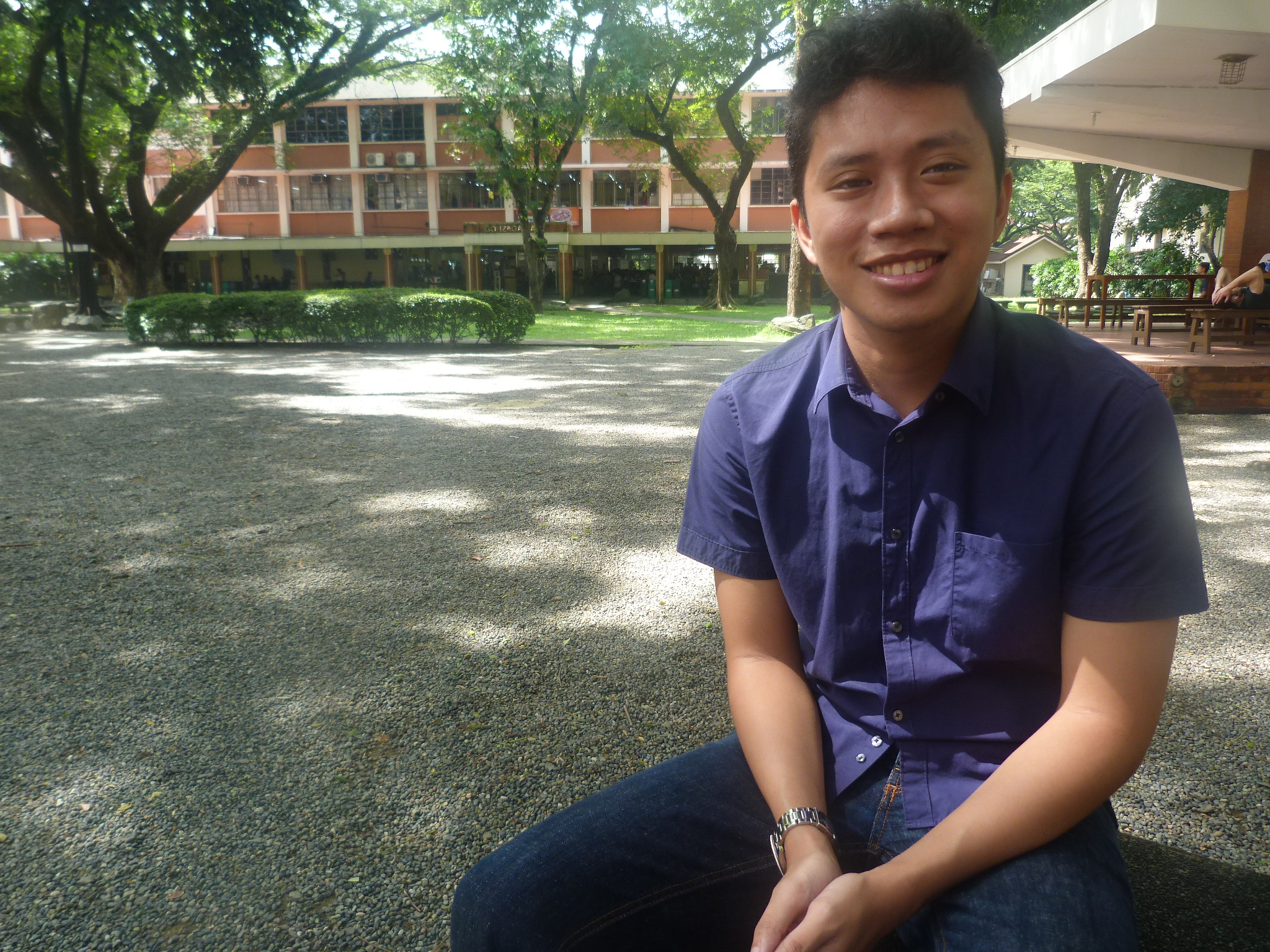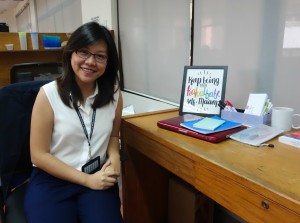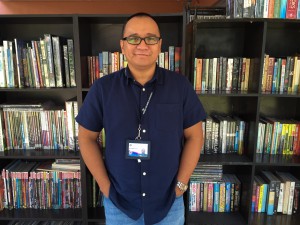Himig Marcos and Lean Yao went to the Zen Garden to interview Prof. Jesus Lemuel Martin, Jr. for Teachers’ Appreciation Week.
Lean Yao (LY): So Sir, what’s your name and the degrees you have acquired throughout your life?
Jesus Martin, Jr. (JM): Jesus Lemuel Martin, Jr. I got my undergraduate degree in Applied Mathematics major in Computational Science in 2010 and then I got my masters in Mathematics in 2013.
LY: So are you planning to take a doctorate soon?
JM: Yes.
LY: Also in Mathematics?
JM: We’ll see.
LY: So Sir, why did you choose to be a teacher?
JM: Let’s see. Well, my mom was an English teacher in high school, so when I was a kid she would bring me to her classes, kind of like a sit-in. But I never really seriously considered teaching until after college because at the time when I was in my senior year, I was deciding whether I was going to go corporate. I was talking to Doctor Bautista, the Dean, the current Dean.
LY: Ma’am Doc Banjo.
JM: Yes, Ma’am Doc Banjo as you would know her. And the talk went to graduate studies, so she offered me a position as a graduate assistant in the department and I said, “Okay, why not?”
When I was a graduate assistant I had to be the substitute teacher for a lot of classes and apparently, I knew what I was doing. After I graduated from my masters, I decided to try teaching some more. And so far, I still like what I’m doing, so I’m still here.
LY: So, ano, Sir, what do you like most about teaching? What’s the reason you get up in the morning and go to school this early to go to classes with noisy kids?
JM: Wala, joke lang. No, it’s really nice to see how the material allows students to see how the world works. I mean I’m in mathematics so I’m in one of the most abstract of fields, and well, this is college where you have the benefit of grappling with abstract things. But I like to think that you know when you go through the material here, you kind of ground yourself on the things that you would really like to think about but would not be able to do so because of more practical concerns. And it’s nice to see students, you know, grappling with those ideas or at least trying to. And it’s interesting to see how learning works. For example, when I’m teaching and for some reason the material is a little too difficult to understand. You have to try to adjust, try to think of an alternative ways to explain things and you find out that, “Ah, oh, that’s how you’re supposed to explain it,” or, “Oh right, that’s kind of how it works as well,” so you learn as well.
Himig Marcos (HM): Sir, what is the best memory that you’ve had in a classroom?
JM: I can think of several like the usual end-of-class speeches. Well, I don’t think we all take it seriously. But sometimes it’s how you deliver the message. If, parang, honesty does not necessarily have to be delivered in a serious manner, that’s really how I do things in class, as you’ve gone through my classes. As you can see, I really don’t like talking about theory all the time or just talking about the content all the time because if I’m getting bored, then you’re probably getting bored. So I guess for me, there is no specific experience because I try to make the classroom as lively as possible for everyone’s sake.
HM: What do you do when you aren’t teaching?
JM: Preparing. No, seriously. The good and bad thing about being a teacher is that technically your hours are only limited, officially, to teaching and consulting. And the consulting that barely gets used, especially if you’re teaching lower year levels.
LY: Uy nagcconsult kami, Sir.
JM: Eh, rare kayo.
LY: The first years, Sir, that guy.
JM: Rare ‘yun eh, unless you know it’s the exam season. ‘Pag midterm ayan na bawal ka na umalis ng department. But, the reality is that for example, you have to make the test, so making a test depending on your mood can take anywhere under an hour or to like an entire day, total number of hours. Then you have to actually check the results and depending again on the students and on your mood, that would be anywhere from a day to a week. And on top of that you have to prepare for the lectures themselves. I remember one time when I was asking some of the senior faculty, Doctor Ruiz, Doctor Mari-Jo Ruiz, mentioned that when she started teaching, for every hour of lecture she would dedicate around four hours of preparation. And I though that was excessive, until I started preparing.
LY: Kulang pa pala.
JM: Oo, depending on the topic kulang pa ‘yun. The more difficult ones, you have to… it’s not just repeating whatever the contents there. For example, it’s a particularly difficult concept. You have to think not just of how to deliver it but what the questions will be. So really, teaching takes up a large amount of my time. But outside of it, research. We do research because we have to do that here in the university, and I try to go out every now and then to maintain my sanity. Driving, drinking, not at the same time, of course.
Kasi for example, Math 22, I started substituting for Math 22 when I was a G.A., so since 2010? And ‘yun nga it happens to be my favorite subject so over the years, syempre, nagsusub ka so you tend to get called to substitute for the same thing, so it’s easier to just be prepared so you start making notes. Eventually when I transitioned to teaching I saw that I already have half of the notes that I needed so I just filled in the gaps. That’s what happened with most of my subjects.
HM: Because Math 22 is a five to six unit course masquerading as a three-unit course diba sir?
JM: Totoo naman ‘yun eh, until now.
LY: Mas gusto ko siya kaysa sa Math 21.
JM: Diba?
HM: Sobra.
JM: Hindi, ‘yun kasi 21, 21 is like 18, it’s basic. I mean, fundamental siya, hindi foundational math siya. Parang you never really start using those things until you get into 22. Kaya hindi kasing fun ang 21 kasi you have to nitpick, you have to build on your skills more. Sa 22 ka palang pwede, if you like ‘yung practicing math mas doon mo makikita.
HM: What valuable lesson did you learn from a teacher?
JM: Well, really, there are three. I can think of three teachers that are more or less my template for how I teach. Not necessarily how I teach, but more or less, they’re the ones that I try to emulate.
Of course, the first would be my mom for obvious reasons. But really, some some people say that I have a knack for teaching. I don’t know if that’s genetic but it’s more likely to be a combination of both. I’ve been attending class since I was 2 years old so, it really takes I guess both side a little bit of the fact that my mom’s a teacher and also the fact that I was exposed to it at an early age. So you pick up some things along the way.
With Doctor Bautista, she was my professor for a lot of subjects. Both undergraduate and masters, and she had this natural ability to sense when the class was starting to get lost. So she’d slow things down and say, “Okay guys, let’s recap what we’ve done so far”, and she really takes care of the students. She draws a fine line between, of course, the student and the teacher. There is still that professionalism, but at the same time, you don’t feel as intimidated because you know that ultimately the goal is for you to learn and she makes you feel that.
And I guess, the last would be Doctor Ruiz, mostly for the same reasons. The nuances are there, of course they have different teaching styles. But ultimately, what I’ve picked up from them is that you really have to balance a lot of things when you’re teaching. So you have to consider the student, you have to take care of yourself, and you have to make sure you deliver the content properly. There.
LY: Since you’re a teacher now, what’s something you want all your students to take with them?
JM: Don’t you already know that? ‘Yun sinasabi ko sa end of class eh. My ano, ano nga ba ‘yun ‘yung mga usual lines ko?
HM: “I breathe fire.”
JM: No, not “I breathe fire,” that’s what you write in “Ateneo Profs to Pick.”
HM & LY: Ahhhh.
LY: Nasulat ko na ‘ata ‘yun.
HM: Nasulat na ‘yun.
JM: But especially in college, the nice thing about being in college is that you are given the chance to fail, a lot. Which does not mean that you should, but the point of that statement is that you are given an opportunity that a lot of people do not have, to make a lot of mistakes and learn from them without suffering some of the more unfortunate consequences. For example, if you go work in the real world, you make a mistake, a particularly costly one can get you fired. When you’re here, you fail a test. So I guess all that I want my students to learn is that failure is always supposed to be a learning experience, but the point of being in college is to learn so regardless of whether you’re a success story or whether you just get by, it’s you who will be able to scrape passing, scrape by college. The most important thing is that whatever you learn from the experience, so make the most out of it.




